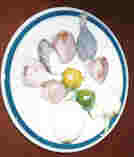Isü Óji - Omenala ndi Igbo
Kola nut - Óji
Óji, is a native seed grown in the sultry forest. It is a seed which is planted and eaten in different regions in Nigeria.
Óji is a prevalent seed in Nigeria and many other African-Caribbean countries, it is however of great significance in the Igboland.
It is of great significance in the Igboland because the breaking, blessing and sharing of Óji is a tradition which has transcended from the progenitors. Our ancestors identified Oji as a very important seed which serve many purposes and which is why the seed is highly regarded and revered in the Igboland.
Óji plays a very important role in bringing a community together. The eating and sharing of kolanut is believed to bring harmony among those who partake in it. Those who partake in the blessing and sharing of kolanut are also believed to experience peace, unity, prosperity, reproduction and progress and many other blessings in their lives. Undoubtedly, one may begin to understand why so much value is attached to oji in the Igboland. Though it is a piece of nut as some may say, however, the attributes and benefits associated with the kolanut has placed it highly amongst those who partake in the sharing and blessing of the kolanut.
It would be interesting to note that kolanut is the first thing which is presented to guest in every Igbo gathering. Óji is served at many Igbo ceremonies such as marriages, new yam festivals, it is also used in settling disputes between siblings or neighbours as well as served at burials, however, the rhetoric rites are not performed during burials.
Different Parts of Igbo Kolanut (Óji Igbo)
The different lobes of kolanut range between two and seven and each lobe or segment symbolise something in the Igboland. It must however be noted that Igbo kolanut does not have two lobes; a kolanut with two segments is not served in the Igboland. Below are different kolanut lobes and what they symbolise.
Óji Ato |
 | A kolanut with three lobes symbolises good relation.
|
Óji Ano |
 | A kolanut with four lobes is a symbol of progress and happiness, thus characterising the impending blessing which will be bestowed on those who partake in the blessing as well as eating of the nut. |
Óji Ise |
 | A five segments kolanut is a symbol of reproduction, thus symbolising the vast blessing which will follow those who eat it. It is said that the five segment nut is highly regarded amongst those who desire success in all spheres of their lives. It would be interesting to note that in the olden days when high importance was attached to large family, this type of kola nut was offered to men who had ample children. This was a mark of respect to them for having large family. Today, reproduction is not only seen in how many children one has, but, however in how successful one has attained in their respective field. Thus, the symbol of the five segment nut still holds strong to those who eat it as well as those who are present during the blessing of kolanut. |
Óji Asa |
 | A six or seven segment kolanut is a symbol of double progress, that is outstanding blessing. It is believed that anyone who partakes in eating of the kolanut will experience incessant progress in every area of his or her life. |
WOMEN'S ROLE IN THE BREAKING OF KOLANUT
Tradition does not permit women to climb, pluck or break kola nut. A wife may present kola nut to her husband to offer to their guest, but under no circumstance must she break or bless the kola nut. The primary reason for this is that kola nut epitomises headship, hence, requiring the need for the husband to bless and break the nut. In the absence of the head of the household, any available man will be called upon to break the kolanut.
Presentation of kola nut
It is the onus of an elderly man from the host family to present kola nut to his guest. It is however, the duty of the traditional ruler of Amaigbo (His royal Highness Eze Nwosu) to present and bless kola nut if he is present at any ceremony in Amaigbo. This also epitomises his headship as Amaigbo traditional ruler.
Usually, when kola nut is presented to guests, an elderly man from the guest family would touch the kola nut and say to the host "Òji eze nò eze na aka", this means that the guests have seen the kolanut which has been presented to them and that the host should proceed to break and bless the nut.
The elderly man could proceed to break the kola nut himself or designate the task to a younger man from his family. Where someone other than the elder himself broke the kola nut, it is later passed on to the elderly man for prayers and or blessings.
Blessing of kola nut
It is the Igbo believe that Oji does not speak or hear English, hence the dictum "Oji anaghi anu bekee".
The elder or Eze then blesses the kola in Igbo lingua franca. He offers a piece of the kola nut to ancestral spirits and deities of the land and takes a piece himself; he dips the nut in okwa ose (or he can eat it with ose oji) before the rest is served to guest. These act are a mark of respect to the ancestral spirit, a symbol of the king’s headship as the leader of the community and a gesture to the guests that the host is happy to have them in her midst.
The myth and custom of kolanut is one of the many sacred tradition transcended from the ancestors and one that will not be wiped out. The practice and adherence to the custom continues to bring unity to those who hold strong to it, it continues to foster peace in families as well as bring revenge to those who offer it to the ancestral spirits and gods for protection and justice.
| Copyright © 2002 - 2007 Theresa Emenike. All rights reserved. |
|



